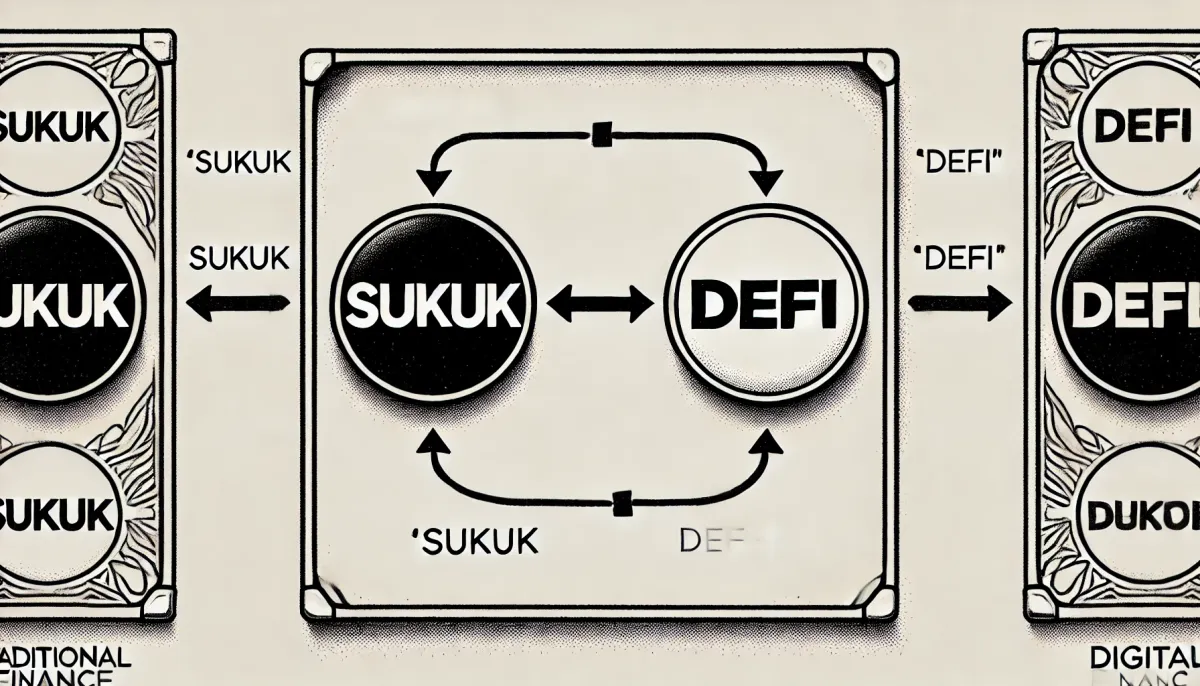Muslim investors now have a unique opportunity to blend traditional Islamic finance, like Sukuk, with the innovation of decentralized finance (DeFi). Balancing these approaches is crucial for building a Shariah-compliant portfolio that offers both stability and growth.
Understanding Sukuk: Stability and Security in Islamic Finance
Sukuk, often referred to as Islamic bonds, are critical tools for financing projects in a manner consistent with Islamic law. Unlike conventional bonds that pay interest (riba), Sukuk investors receive returns tied to the revenue generated by tangible assets.
- Market Size and Growth: The global Sukuk market is projected to see an issuance volume of $160 billion to $170 billion in 2024, after experiencing a slight decline from $168.4 billion in 2023. The reduction in issuance reflects economic challenges in core Islamic finance countries like Saudi Arabia and Indonesia, where local-currency issuances have decreased. However, foreign-currency issuances have grown by 30%, fueled by demand from international investors seeking stability in uncertain economic times.
- Types of Sukuk: Common types include Sukuk Al Ijarah (lease-based) and Sukuk Al Mudarabah (profit-sharing). For instance, Sukuk Al Ijarah is often used for real estate or infrastructure projects, offering investors a share of the lease payments from the asset. In 2023 and 2024, Saudi Arabia leveraged Sukuk Al Ijarah to finance its ongoing Vision 2030 infrastructure projects.
- Performance in Economic Downturns: During periods of high market volatility, such as in 2023, Sukuk demonstrated resilience with yields between 3-5%, making them attractive for conservative investors. This stability comes from their asset-backed nature, as the returns are tied to cash flows from tangible assets like real estate or energy projects.
The Rise of DeFi: High Returns with High Risks
Decentralized Finance (DeFi) represents a new way to conduct financial activities without relying on traditional intermediaries like banks. Built on blockchain technology, DeFi protocols enable peer-to-peer lending, borrowing, and earning yields through liquidity pools.
- Market Growth and Adoption: As of 2024, the DeFi market is valued at around $26 billion, a significant increase from $14.35 billion in 2023. The growth is driven by innovations in decentralized exchanges (DEXs), automated market makers (AMMs), and Layer-2 solutions that improve transaction speeds and reduce costs. Despite this growth, DeFi remains highly volatile, with market fluctuations tied closely to global liquidity conditions and regulatory shifts.
- Yield Potential: Investors can earn 10-15% returns through staking or yield farming on platforms like Uniswap and Aave. However, these opportunities come with risks such as impermanent loss, where liquidity providers could end up with a lower value of assets due to price changes between the paired tokens. The risk of smart contract vulnerabilities remains a major concern, as the DeFi space has seen over $3 billion in security breaches since 2022.
- Compliance Challenges: While the DeFi space is built on openness and transparency, its lack of standardized Shariah certification can be a barrier for Muslim investors. To address this, some DeFi projects have sought to develop Mudarabah (profit-sharing) structures and eliminate interest-based lending, creating a bridge to Islamic principles. Examples include platforms like Halal DeFi, which provides transparent profit-sharing models aligned with Islamic values.
Sukuk vs. DeFi: A Comparative Analysis
| Feature | Sukuk | DeFi | Synergies and Opportunities |
|---|---|---|---|
| Asset-Backed Nature | Tied to physical assets like real estate | Often tied to digital assets or liquidity pools | Tokenized real assets could integrate both. |
| Risk Profile | Lower risk, stable returns (3-5% annually) | Higher risk, high potential returns (10-15%) | Blending both can balance risk and yield. |
| Compliance | Regulated with Shariah oversight | Requires project-specific screening | DeFi protocols can adopt Shariah guidelines. |
| Liquidity | Moderate; tradable on specific platforms | High liquidity; assets can be quickly exchanged | DeFi can enhance Sukuk's liquidity through tokenization. |
| Transparency | Relies on traditional audits and reporting | Built-in transparency through blockchain | Blockchain can bring real-time transparency to Sukuk. |
Strategy: Building a Balanced, Shariah-Compliant Portfolio
A well-structured portfolio for Muslim investors should balance the stability of Sukuk with the growth potential of DeFi. Here’s a recommended strategy for a diversified approach:
- Core Stability with Sukuk (60-70%):
The foundation of a conservative, income-focused portfolio should include a majority allocation to Sukuk, which can provide stable returns even in volatile markets. For example, Sukuk Al Mudarabah issued by the UAE in 2024 offers a 4% return, backed by cash flows from real estate investments. Sukuk tied to infrastructure projects, such as those financing renewable energy initiatives in Saudi Arabia, also provide reliable income streams. - Growth Allocation with DeFi (20-30%):
Allocate a smaller portion to DeFi projects, emphasizing those that offer profit-sharing models or are backed by tangible assets like tokenized real estate. This allocation allows investors to capture the upside potential of DeFi while managing risk. For instance, Marhaba DeFi offers profit-sharing pools that comply with Islamic principles, presenting a viable growth opportunity with yields reaching 8-10%.This segment could also include real asset-backed tokens available through DeFi platforms, such as tokens representing ownership in rental properties or agricultural ventures. By selecting projects that align with Islamic values, investors can access DeFi’s high-growth potential without compromising on compliance. - Liquidity Management with Islamic Stablecoins (10%):
Hold a portion of the portfolio in compliant stablecoins, such as XAUt (a gold-backed token) or other asset-backed tokens that adhere to Islamic guidelines. These assets provide a liquidity buffer, enabling investors to respond quickly to market opportunities or to cover short-term financial needs without selling long-term holdings. For example, during periods of high market volatility, having a reserve in stablecoins allows an investor like Fatimah in Dubai to rebalance her portfolio without needing to liquidate her positions in DeFi or Sukuk, thus maintaining her long-term investment strategy.
Overcoming Compliance Challenges: Blending Sukuk and DeFi
Addressing Shariah Compliance in DeFi: While traditional Sukuk benefit from established Shariah oversight, DeFi protocols must navigate the complexities of Islamic compliance. Platforms like Halal DeFi are collaborating with scholars to ensure that their smart contracts and profit-sharing mechanisms meet Islamic standards. This involves designing contracts that avoid interest (riba) and ensuring that investments are backed by real, tangible assets.
- Riba in DeFi: One of the primary challenges in the DeFi space is the prevalence of interest-based lending models. However, alternatives such as Mudarabah (profit-sharing) pools are gaining traction, allowing investors to share in the profits of a DeFi protocol without earning or paying interest. This aligns with the principles of Islamic finance and offers an attractive way for Muslim investors to participate in DeFi.
- Security Risks: The DeFi sector has faced significant risks, with over $3 billion lost to smart contract exploits in recent years. To mitigate this, investors should prioritize platforms that have undergone third-party audits and have insurance coverage for their assets. Projects with clear security protocols and a track record of compliance offer a safer way to engage with DeFi.
- Standardization Efforts: Recent developments, such as the proposed AAOIFI Sharia Standard 62, aim to bring greater standardization to Sukuk issuance, potentially impacting how Islamic financial products are structured. This could create opportunities for integrating blockchain technology into traditional Islamic finance, making Sukuk more transparent and accessible through tokenization.
Future Trends: The Convergence of Traditional and Digital Finance
The integration of Sukuk and DeFi has the potential to reshape Islamic finance in several ways:
- Tokenized Sukuk: Advances in blockchain technology could significantly reduce issuance costs by 15-20% and make Sukuk more accessible to retail investors. For instance, Indonesia’s digital Sukuk pilot has demonstrated how blockchain can enhance transparency and lower transaction costs, making these investments more efficient.
- Growth of Sustainable Sukuk: With $10-12 billion in sustainable Sukuk issuances in 2024, the focus on ESG (Environmental, Social, and Governance) criteria has created new opportunities for Muslim investors. This trend is particularly strong in the Gulf Cooperation Council (GCC) countries, where financing green energy projects aligns with broader sustainability goals.
- Cross-Border Payments through DeFi: With global remittances to countries like Pakistan reaching over $30 billion in 2023, DeFi’s potential to reduce transfer costs is substantial. Traditional remittance services often charge 5-7% in fees, but DeFi protocols could lower these costs to 1% or less, providing a Shariah-compliant alternative for sending money across borders.
Practical Example: Integrating Sukuk and DeFi
Consider an investor like Bilal, a 45-year-old entrepreneur in the UAE looking to diversify his portfolio while maintaining a focus on ethical investments. His strategy includes:
- 65% in Sukuk: Bilal invests in a mix of sovereign and corporate Sukuk, such as UAE government Sukuk and green Sukuk linked to solar energy projects. This allocation gives him consistent returns of around 4% while aligning with his values.
- 25% in DeFi: Halal DeFi offers investors a Shariah-compliant entry into the digital asset space through the $HDF token, targeting a 22% Internal Rate of Return (IRR). This is achieved by investing in early-stage Web3 projects and strategic trading, all within Islamic principles. By investing in $HDF, investors like Bilal gain access to the digital economy's growth while staying true to Islamic values. Halal DeFi prioritizes transparency, ethical investment, and investor control, unlike interest-based DeFi products.
- 10% in Stablecoins: Bilal keeps a reserve in XAUt gold-backed tokens to ensure he has liquidity available for emergencies or to seize market opportunities without disrupting his long-term investments.


